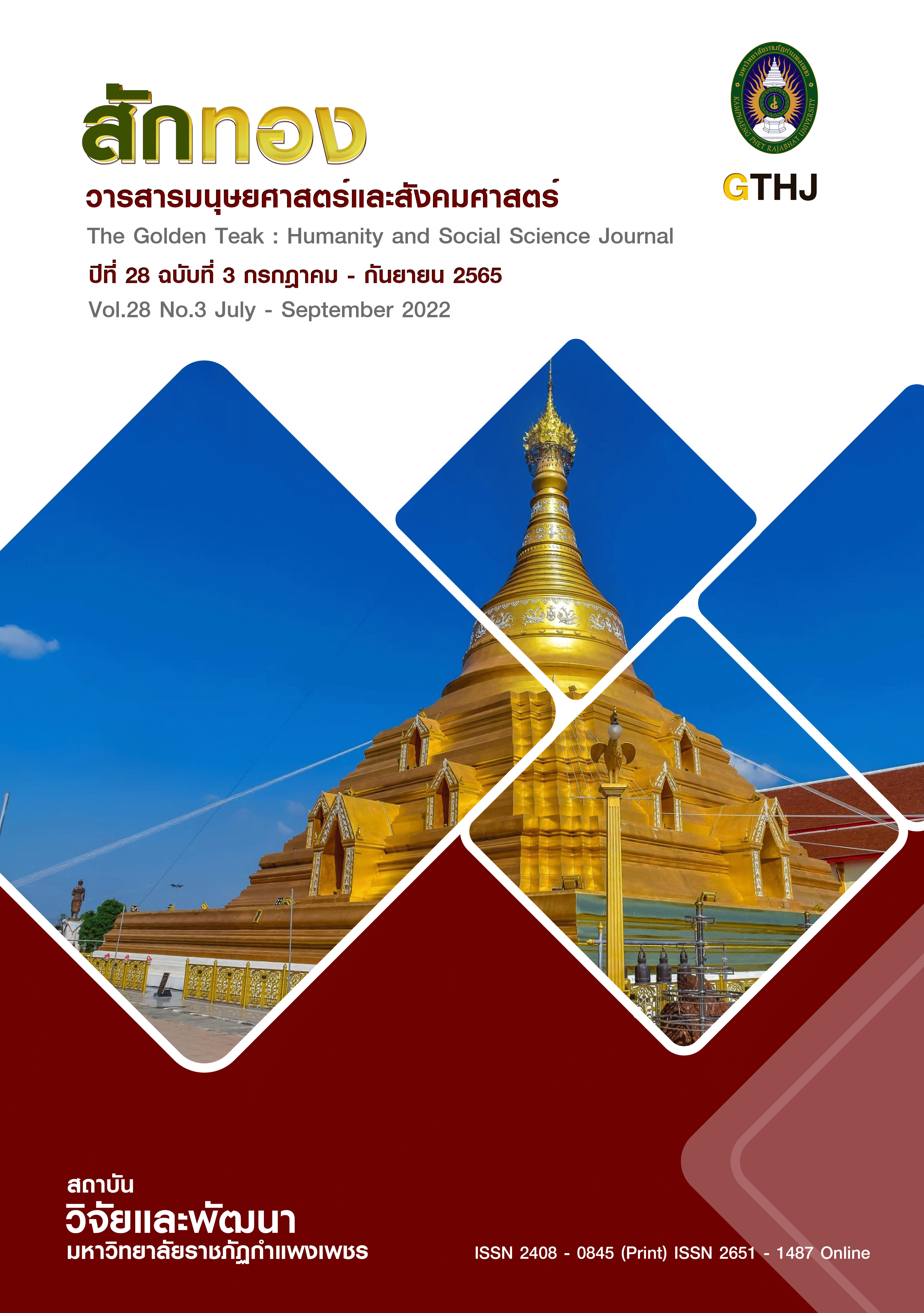THE DEVELOPMENT OF CLOUD BASED LEARNING BY USING COLLABORATIVE LEARNING AND CRITICAL THINKING TO ENHANCE DIGITAL MEDIA LITERACY FOR MATTAYOM SUKSA STUDENTS
Main Article Content
Abstract
This study aimed to 1) develop collaborative learning with critical thinking on cloud computing to promote digital media literacy of secondary school students and 2) examine the quality of collaborative learning with critical thinking on cloud computing to enhance digital media literacy among high school students. The researchers carried out using the research and development process with the resources, selected by the purposive selection, comprised 10 experts. The research design was applied using the synthetic instructional model and the assessment for the suitability of teaching methods using a questionnaire. Statistics were analyzed by using arithmetic mean and standard deviation. The research process consisted of 6 steps. First, the researchers analyzed basic information related to learning management. Second, the researchers analyzed the basic concepts of the theory and concept of learning management to synthesize the essence as the basic concept of the model to be developed. Third, the researchers created a model and defined the elements of the model's learning management process. Fourth, the researchers prepared a handbook for using the learning management and provided supporting documents including learning management plans, digital media literacy test and digital media literacy test and digital media literacy skills assessments. Fifth, the researchers checked the quality of the model. Last, the researchers revised the learning management and supporting documentation. The results obtained a model of collaborative learning with critical thinking on cloud computing to enhance digital media literacy among secondary school students, consisting of 5 aspects. Firstly, the inputs consisted of 1) principle 2) objective 3) learning process 4) contents 5) measurement and evaluation. Finally, the assessment results of the synthetic model of learning management were appropriate at the highest level. Experts accepted the learning management to be able to use it as appropriate.
Article Details

This work is licensed under a Creative Commons Attribution-NonCommercial-NoDerivatives 4.0 International License.
บทความที่ได้รับการตีพิมพ์เป็นลิขสิทธิ์ของวารสาร สักทอง : วารสารมนุษยศาสตร์และสังคมศาสตร์ สถาบันวิจัยและพัฒนา มหาวิทยาลับราชภัฏกำแพงเพชร
ข้อคิดเห็นใดๆ ที่ปรากฎในวารสารเป็นวรรณกรรมของผู้เขียนโดยเฉพาะ ซึ่งมหาวิทยาลัยราชภัฏกำแพงเพชรและบรรณาธิการไม่จำเป็นต้องเห็นด้วย
References
Chaopho, T., Sermsong P., Wongchan, S. & Lertsaphung, S. (2020). Development of Microsoft Teams-Based Learning Model for Introduction to Political Science. Journal of Modern Learning Development, 5(6), 261-274.
Dick W., Carey L. & Carey, J.O. (2001). The systematic design of instruction. (5 th ed.). New York : Pearson Education.
Hobbs, R. (2010). Digital and Media Literacy : A Plan of Action. New York : The Aspen Institute.
Institute of Child and Youth Media. (August 18, 2016). Conceptual framework for democratic citizens, keeping Up with the media, information and Digital. In Moving citizens build a Thai society to keep up with media information and digital (MIDL). Bangkok : Ebina House Hotel.
Joyce, B. & Weil, M. (2004). Model of Teaching. (7 th ed.). London : Allyn & Bacon.
Khamanee, T. (2001). Learning process, meaning, development guidelines and grievances. Bangkok : Academic Quality Development (Public Organization).
Kongmanus, K. (2018). Digital tools to transform knowledge: digital way of life. Journal of Education Naresuan University, 20(4), 279-290.
Prachanban, P. & Konpuang, A. (2016). Research and Development of 21st Century Skills Scale on Media Literacy of Secondary School Students. Journal of Education Naresuan University, 18(1), 144-154.
Srisaart, B. (2002). Preliminary research. (7 th ed.). Bangkok : Suwiriyasan.
Srithat, E. (2016). Using Behaviors and perceptions influence of digital media to generation y and generation z in Bangkok and metropolitan region. Master Thesis, M.A., National Institute of Development Administration, Bangkok.
Tansuwannon, J. (2017). Think differently, be creative, keep up with the media, uphold morality : characteristics and important skills in the 21st century for Thai youth. Journal of Surat Thani Rajabhat, 4(2), 13.
Thitipetchkul., T., Sompong, N. & Rampai, N. (2019). Development of Learning Management Model on Cloud Computing System Based on Connectivism to Enhance Information and Communication Technology Literacy for Undergraduate Students. Ratchaphruek Journal, 18(1), 38-48.


